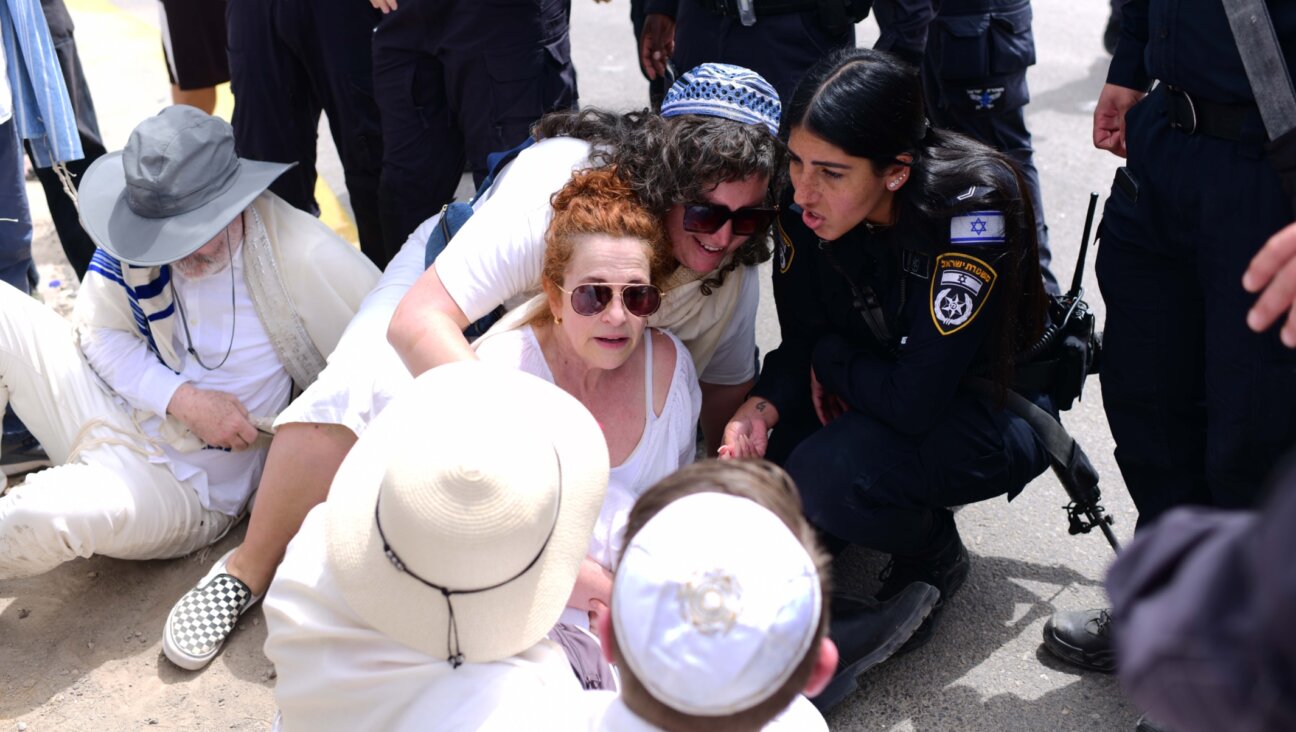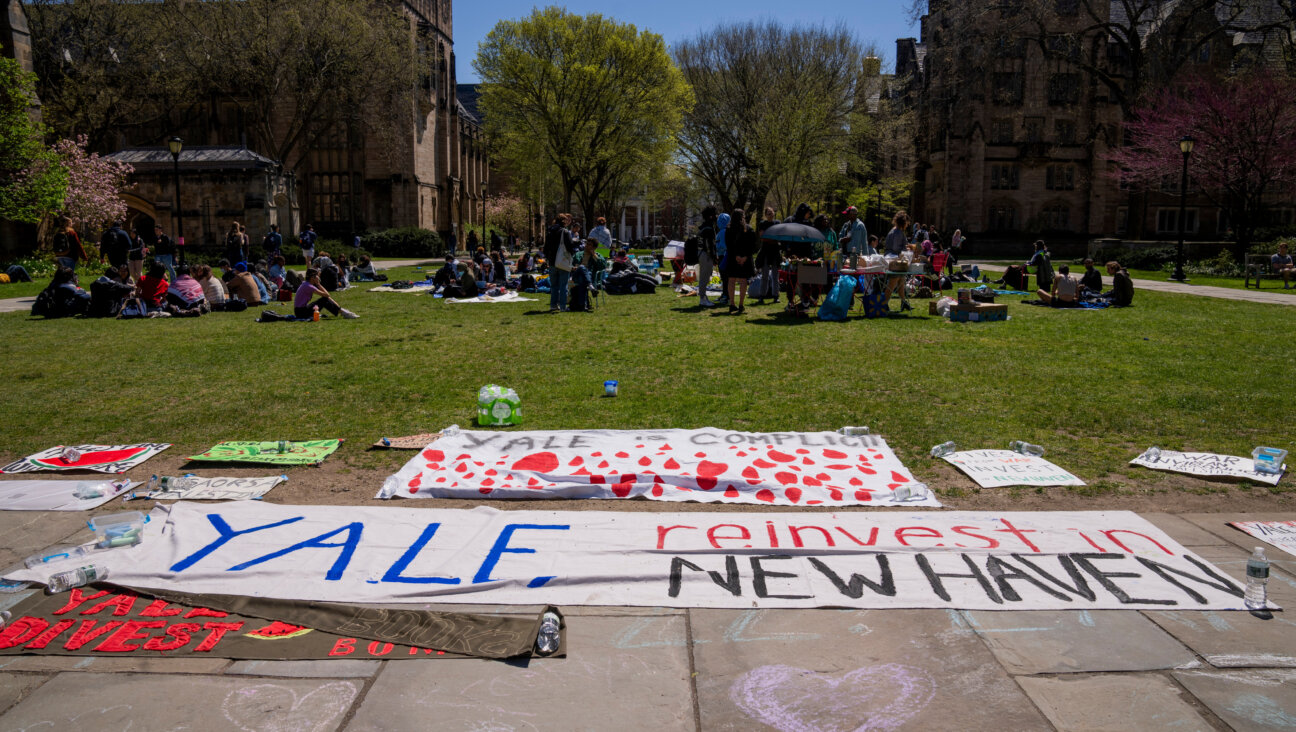Public Scandals, Recession Will Be Focus of Many High Holy Day Sermons
After a year marked by the Bernie Madoff scandal, the arrest of rabbis on money-laundering charges, Israel’s war in Gaza and new broadsides against Israel in media outlets from Sweden to Cairo, American rabbis seemingly have plenty of material for their High Holidays sermons this year.
Many, however, are focusing on something a bit closer to home: the recession.
“How can we come to learn what we can live with and live without?” asked Rabbi Robert Levine of Congregation Rodeph Sholom, a Reform synagogue in New York.
Levine said he plans to use a sermon to ask congregants to determine their individual net worth – as human beings, not simply earners.
On the second night of Rosh Hashanah, Levine said he will hold a study group using the Madoff scandal as a starting point for a discussion of free will and how to learn from the sins of others.
Rabbi Michelle Werner of B’nai Israel in Rochester, Minn., said she plans to use “Ethics and Responsibility,” a book by British Chief Rabbi Jonathan Sachs, as a launching point for a discussion of personal ethics.
In Roswell, Ga., Rabbi Fred Greene of Temple Beth Tikvah also plans to talk about the recession – but not about Madoff, whose Ponzi scheme cost Jewish institutions hundreds of millions of dollars.
“He doesn’t deserve attention from the community,” Greene said of the disgraced financier. “The only lesson that can be learned from Madoff is where a life of living in excess without moral values and commitment to community can lead.”
Rather, Greene said, he’ll try to highlight for congregants some of the positives that have resulted from the aching economy. As an example, he noted that with people going out less to save money, they are spending more time at home with family and community, strengthening bonds that may have been overlooked during more prosperous times in a consumerist economy.
“What’s important to remember this holiday season,” Greene said, “is there is more to life than having more.”
In many communities, rabbis plan to use their sermons to focus on more intimate matters than global trends affecting the Jewish community.
Rabbi Michael White of Temple Sinai in Roslyn, N.Y., said he will present congregants with a “Jewish road map” of how to cope with the global recession by focusing on what’s “truly important: love and companionship, community and service to others.”
Rabbi Michelle Goldsmith, who started her job at Temple Beth-El, a Conservative synagogue in Birmingham, Ala., over the summer, said she will use her Rosh Hashanah sermon to introduce herself officially to her new community. She plans to outline how she’d like to build her synagogue’s relationship with Israel and the larger community of Birmingham.
In Oakhurst, N.J., current events have hit very close to home for Rabbi Gordon Yaffe. His synagogue, Temple Beth El, is adjacent to the town of Deal, where several rabbis were arrested on money-laundering charges in July.
Unable to ignore the subject, Yaffe said the scandal – along with Madoff fiasco – represent opportunities to awaken American Jews to the need to repair their public image.
“My sermon’s most important lesson is the concept that we are all one big family and need to do what we can to respect one another, and that we are each responsible for the other,” Yaffe said.
One of the greatest challenges rabbis face on the High Holidays is how to deliver a sermon that works both for involved congregants and those who are disconnected from synagogue life.
“I have these people for a few hours and want to reach them best, but also make the regulars feel comfortable,” said Rabbi Steven Schwarzman of Congregation Beth Israel, a Conservative synagogue in Bangor, Maine.
Tapping into a theme with which many young congregants doubtless will be able to identify, Rabbi Robert Lennick of Congregation Keneseth Israel, a Reform synagogue in Allentown, Pa., is planning on talking about Twitter and Facebook. The sermon will focus on the “sins of silence,” he said.
With modern technologies like texting, instant messaging and online social networks, families and communities now communicate without actually talking.
“We don’t let people know when we feel both positively and negatively,” lamented Lennick, who said he wants his congregants to come away from holiday services challenged at how they can apply Judaism to the realms of politics, economics and community.
Rabbi Uri Topolosky, who leads Congregation Beth Israel, an Orthodox shul in Metairie, La., will use his sermon as a launching platform for a capital campaign to rebuild the community’s longtime synagogue, which was flooded and damaged four years ago in Hurricane Katrina. His congregation now rents chapel space and offices at a nearby Reform temple. The year of the storm, Topolsky held High Holidays services in a hotel.
“My themes will relate to building community, building a synagogue and giving tzedakah,” he said.
Topolosky said the synagogue’s president hopes that this year’s High Holidays sermons will help generate $1 million toward the rebuilding fund.
Rabbi Elliot Skiddell of the Reconstructionist Congregation Beth Emeth in Hewlett, N.Y., said he’s planning to deliver a sermon that emphasizes the importance of memory – “the memory we’ve been given by parents and grandparents, and how we can create new memories that can be talked about by our children and grandchildren.”
“I’m of the generation of Woodstock,” Skiddell said. “It’s important to reflect on where we were then, where we are now and where we are going.”

I hope you appreciated this article. Before you go, I’d like to ask you to please support the Forward’s award-winning journalism this Passover.
In this age of misinformation, our work is needed like never before. We report on the news that matters most to American Jews, driven by truth, not ideology.
At a time when newsrooms are closing or cutting back, the Forward has removed its paywall. That means for the first time in our 126-year history, Forward journalism is free to everyone, everywhere. With an ongoing war, rising antisemitism, and a flood of disinformation that may affect the upcoming election, we believe that free and open access to Jewish journalism is imperative.
Readers like you make it all possible. Right now, we’re in the middle of our Passover Pledge Drive and we still need 300 people to step up and make a gift to sustain our trustworthy, independent journalism.
Make a gift of any size and become a Forward member today. You’ll support our mission to tell the American Jewish story fully and fairly.
— Rachel Fishman Feddersen, Publisher and CEO
Join our mission to tell the Jewish story fully and fairly.
Only 300 more gifts needed by April 30
























